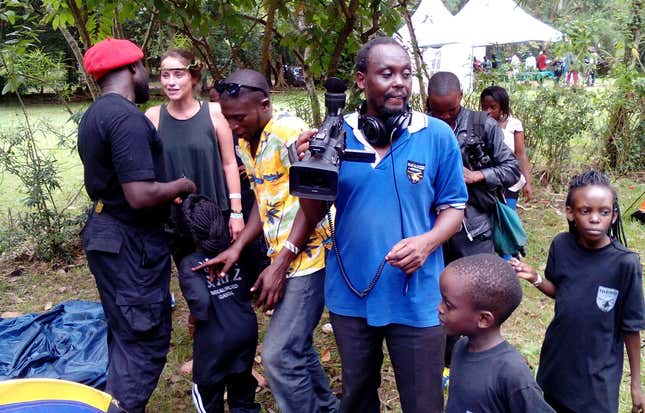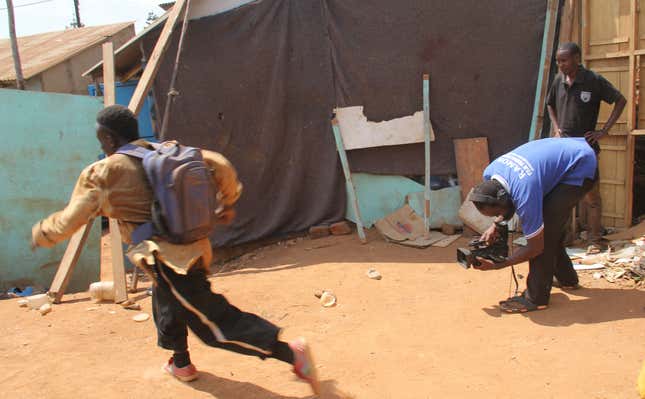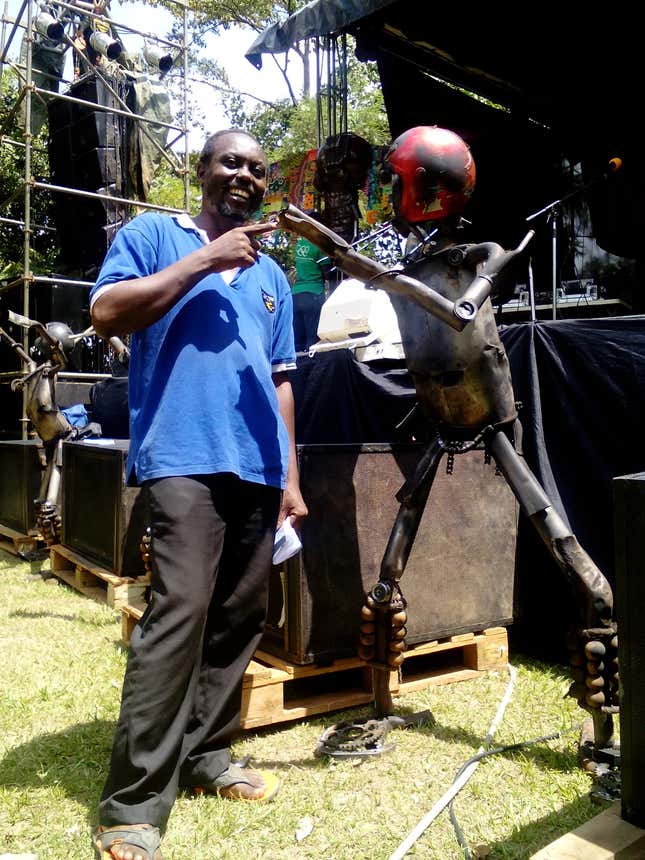A scuffle has broken out between a drunken soldier and a civilian at a club.
The civilian is reproaching the soldier for taking over his wife on the dance floor. Next thing, the civilian unleashes the most improbable of scissor-kicks, with the obvious aid of a computer generated effect and the soldier goes crashing on the floor with a loud thud. Sounds of shattering beer bottles and breaking chairs rend the air as the opposing parties tear into each other with reckless abandon.
Welcome to Wakaliwood, Uganda’s fledgling movie business. The scene is from one of the genres already classic features: Who killed Captain Alex?
This is the action-packed world of Isaac Nabwana, a Ugandan film producer, who as a young boy growing up in the 70s and 80s Kampala, had great admiration for Chinese Kung Fu and Western action movies. Back then, the 2016 Quartz Africa Innovator honoree, never went to the local cinema to watch movies for fear of reprisal from his parents who believed children who went to cinemas played truant to do so.
So, he relied on his own fantasy and the stories told to him by his elder brothers and childhood friends on countless action movies they watched. He was fascinated by characters like American-born Chinese martial arts icon, Bruce Lee, the superstar of Hong Kong’s booming 1970s’ cinema.
“Even now, I still relish in the imagination of my brothers’ storytelling, which I partly rely on to produce movies. They were very good storytellers,” the self-taught movie director, producer, script-writer and editor tells Quartz.

The 42-year old Ugandan, a director at Ramon Film Productions, is synonymous with Wakaliwood, Uganda’s fledgling homegrown movie business. He has produced over 40 low-budget movies at a makeshift studio in the slums of Wakaliga in Kampala. With Who Killed Captain Alex (2010), an action film registering huge success on YouTube (the trailer has over 2.6 million views), it could be just the start for Uganda’s keen movie fans. At the time he was just starting out in 2005, Nabwana never imagined that anyone beyond Wakaliga slum would watch his movies. But, YouTube has helped bring Wakaliwood to the world.
The action and fight scenes of the movies are so over-the-top and unusual for African movies that it almost doesn’t matter that movies are filmed in a language spoken mainly just by Ugandans. For Nabwana, the message in his movies is best relayed by the actors when they use local dialect. A video jockey then makes the voiceover in English or any other language to appeal to a wider audience.
“A lot of movies from places such as China, India and other parts of the world are also filmed in the local languages. I think that really adds value to the storyline. The actors act naturally when using the local language. It is the same case here in Uganda as it brings out the best in the actors –the real message, the real gestures and the like,” Nabwana points out.
Nollywood model
On the African continent and beyond, Nigerian movies have created the template for how to market and distribute African culture to the rest of the world via feature film. Nollywood has created huge stars over the last two decades. Many African countries have tried to come up with their version of Nollywood, itself a Nigerianization of Hollywood, but few countries have been able to register meaningful success. Nollywood’s success has been attributed to its inclination for telling African stories never before captured by western movies. This has kindled a cultural phenomenon across the continent, with Africans of all socio-economic status seeing themselves in one way or the other in the movies.

While most of the movies out of Nigeria, Ghana and elsewhere revolve around common themes of love, money, power, voodoo and corruption, Uganda’s Wakaliwood is carving a niche for itself as an action film industry. It combines elements of Chinese martial arts, old western action movies together with Ugandan culture. Today, the Wakaliwood movies’ stunts and sound effects indeed look outdated and rudimentary compared with even the most basic made-for-TV movie in the US. But, Nollywood started 20 years from a similar basic point with its outlandish tales, poor narrative structure and weak production values, but today much of that has improved and it generates $600 million a year for Nigeria’s economy.
And like the bad B-movies of years gone by, Wakaliwood movies have a naive local charm which is already garnering a cult-like following.
At his ramshackle studio in Wakaliga informal settlement, Nabwana eats, sleeps and thinks action movies. With little support from the government, he relies on the police for their uniforms for some of his movies. He is, nonetheless, always arrested for being in possession of the uniforms while shooting movies. He’s even tried borrowing a police helicopter for use in some scenes in his films, but his request has never been granted.

He can’t afford to pay for extras, but occasions such as riots on the streets of Kampala often provide him with the perfect scenes for some of his movies. A case in point was the September 2009 Buganda riots in Kampala, which proffered him the opportunity to film military tankers, scenes that spiced up Who Killed Captain Alex?
“When I uploaded the movie on YouTube, people loved it. It was the first action movie made in Africa by Africans,” he says. “It cost less than $200 to produce the movie. We improvised a lot of the equipment we used. Moreover, no one was paid to take part in the movie.”
“Every day, I see many young, promising filmmakers coming up. They are very good at their work but they just need support. I have trained a number of them. I keep telling them that even without funding or government support, they can still make good movies that can give them a head start in their careers. After all, the Nigerians have done it.”




